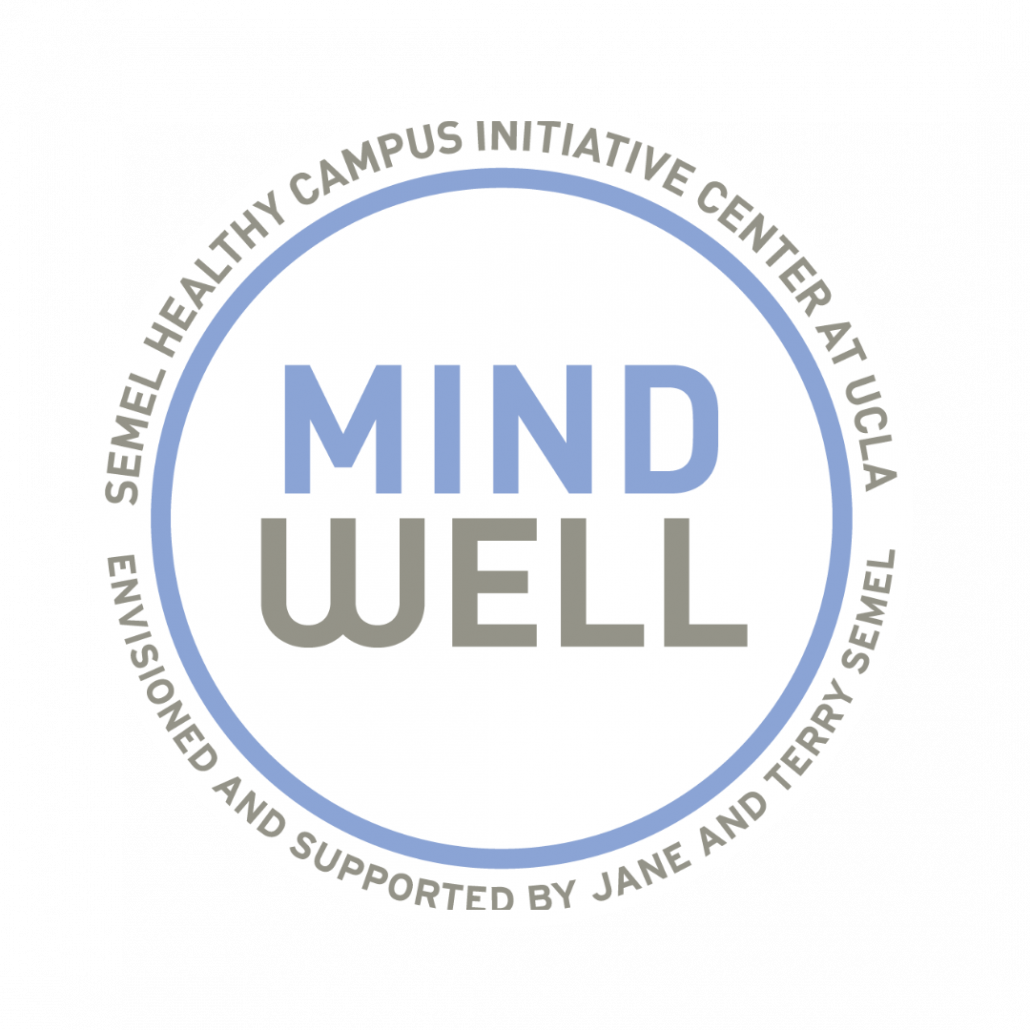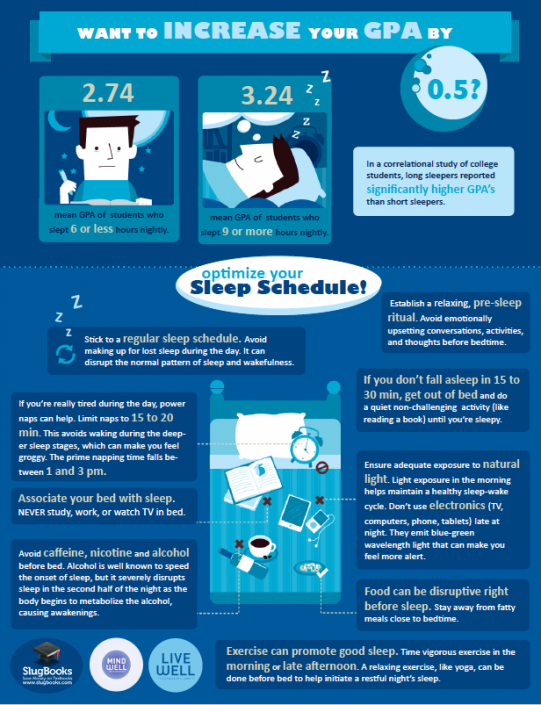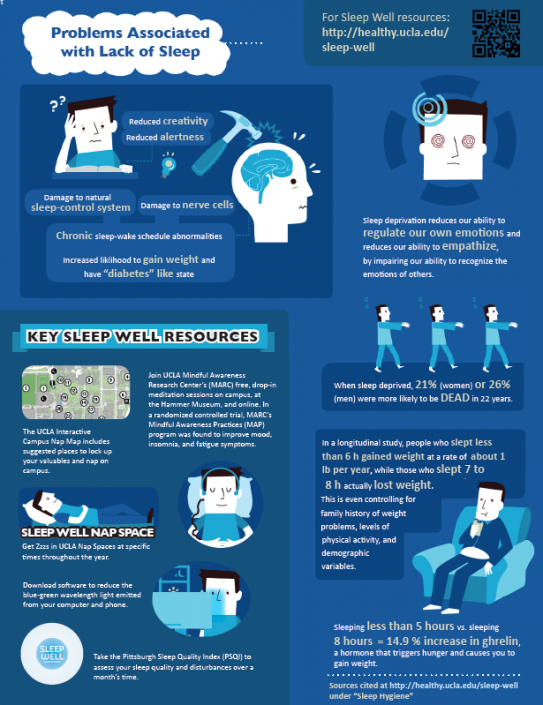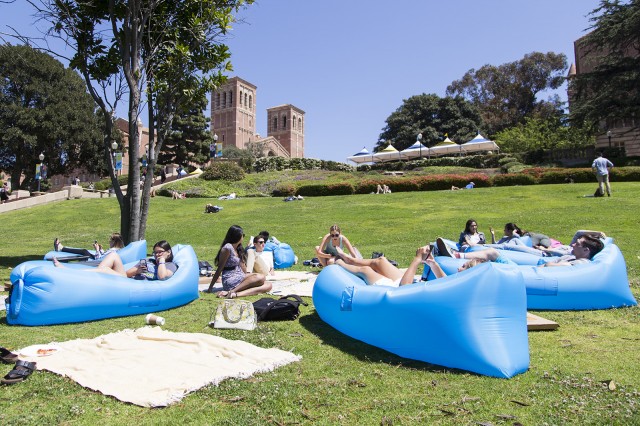Sleep Well
The UCLA Sleep Well Campaign aims to:
- Connect and integrate various Mind-Well partners to form new and highlight existing sleep and resiliency-building activities that are both replicable and sustainable
- Deliver broad and targeted promotion of sleep and stress-reduction education to enhance positive sleep hygiene, quantity and quality of sleep; and
- Ultimately promote wellness of mind, brain and spirit, foster creativity, and enhance social connectedness of UCLA students, faculty, and staff.
- Sleep Hygiene
- Sleep Hygiene Fact Sheet
- Check out recommended sleep practices with this simple sleep hygiene fact sheet, co-created by UCLA Mind Well and Dr. Alon Avidan, Professor of Neurology at UCLA and Director of both the UCLA Sleep Disorders Center and UCLA Neurology Clinic.
- Promote better quality sleep by practicing good sleep hygiene!
- Sleep in College: Check out the Campus & Student Resilience Sleep 101 videos to learn more about how sleep effects your well-being in college.
- Rate Your Sleep with the PSQI
- Want to know more about your sleep? Rate it the way researchers do!
- The Pittsburgh Sleep Quality lndex (PSQI) is a self-rated questionnaire which assesses sleep quality and disturbances over a months time. Here is the PSQI, the correct scoring algorithm, the original article, and the scoring database.
- Buysse,D.J., Reynolds,C.F., Monk,T.H., Berman,S.R., & Kupfer,D.J. (1989). The Pittsburgh Sleep Quality Index (PSQI): A new instrument for psychiatric research and practice. Psychiatry Research, 28(2), 193-213. The detailed scoring instructions are at the end of this journal article
- Sleep Hygiene Fact Sheet
- Why Do We Need Sleep?
- Adequate sleep is needed to clear cell waste from the brain. Dr. Alon Avidan, Professor of Neurology at UCLA and Director of both the UCLA Sleep Disorders Center and UCLA Neurology Clinic, says this is one of the most important and critical finding in recent years about the possible function of sleep.
- Hear these neuroscientists explain: Why Do We Sleep? TED talk by Dr. Russell Foster
- One UC Berkeley study found poor sleep can lead to loneliness & social rejection
- One more reason to get a good night’s sleep: TED Talk by Jeff Iliff
- Scientists study genetic network behind sleep duration.
- Napping: Ideally we would get enough sleep at night that we would not feel tired during the day. Recognizing that this can be a challenge, UCLA Mind Well has created a map of possible nap spaces on campus and their pros & cons.
- Get a printable Nap Map here. This map shows the numerous campus locations that are perfect for taking a nap, with pros and cons for each spot.
- Rent an inflatable lounger or blanket from the Student Activities Center and enjoy a nap outside on UCLA’s beautiful campus. Read more.
- UCLA Interactive Campus Map – Click on “Layers” and select “Nap Map” The Nap Map layer includes locations where you might nap on campus, throughout the year. We also identified places where you can use lockers to lock up your belongings nearby – so you may nap soundly without the worry that your stuff might get “napped”
- Watch this Daily Bruin Video of great nap spots on campus.
- Did you know that taking naps lasting longer than 45 minutes to an hour do more harm than good? Listen to what Dr. David Baron, Executive Director of the Ashe Center, has to say about about the intended purpose of the napping program, the proper measures for effective sleep hygiene, taking “nap tests” to determine our individual napping needs and how caffeine and alcohol can affect our sleep cycles.
-
Our Biological Clocks
- Chronic disruption of our circadian rhythm, our 24-hour internal timing system, can have a major impact on health consequences. UCLA Chancellor Gene Block, Distinguished Professor of Psychiatry and Biobehavioral Sciences, specializes in circadian biology and has described the science behind the circadian rhythm and has offered recommendations for good sleep hygiene in his article in the Wall Street Journal.
- In a recent, randomized controlled study of about 120 UCLA undergraduate students, our Mind Well U-Reviews Sleep Well team found that students who had a real f.lux blue-green wavelength reduction at night relative to no change showed a small but significant change in sleep onset latency. Also, we found a small but significant correlation of hours of sleep one gets a night (pre) and GPA and a significant reduction in sleep problems over time, independent of the f.lux intervention, suggesting perhaps that just making students aware of sleep problems might have some benefit (research article in development)
- Check out this TED talk by Jessa Gamble: Our natural sleep cycle is nothing like what we do now
- Psychological Approaches For Improving Sleep
- Sleep deprivation not only affects physical functioning such as immune regulation, it produces mood disturbances, including anxiety and depression, and also inappropriately modulates the human emotional brain. Recent findings show that psychological approaches are effective approaches for improving sleep. If you’re having trouble sleeping, consult with a Counseling and Psychological Services (CAPS) counselor, join a specific CAPS support/therapy groups, and/or visit The RISE Centers Sleep 101 Online Module to learn how to get more (or better quality) Zzzs.
- Relevant research:
- Pilcher, J. J., & Huffcutt, A. J. (1996). Effects of sleep deprivation on performance: a meta-analysis. Sleep: Journal of Sleep Research & Sleep Medicine.
- Yoo, S. S., Gujar, N., Hu, P., Jolesz, F. A., & Walker, M. P. (2007). The human emotional brain without sleep—a prefrontal amygdala disconnect. Current Biology, 17(20), R877-R878.
- Mindful Meditation for Improving Sleep
- The UCLA Mindfulness Awareness Research Center (MARC) often provides their Mindfulness Awareness Practices (MAPs) program for research studies at UCLA and worldwide. We were delighted to learn that their six weeks MAPs course improves sleep in older adults, 50% of whom report sleep disturbances.
- In a study published February 2015 in the JAMA Internal Medicine, MAPs was found to improve insomnia symptoms, depression symptoms, fatigue interference and fatigue severity as compared to a control group who underwent a sleep hygiene education program.
- Whether you are struggling with sleep, general stress, anxiety, or are simply curious, MARC MAPs courses are available throughout the year. The MARC has free drop-in mindfulness meditation sessions on campus, at the Hammer Museum, and online.
- While we are pleased by the results, it is important to remember that these studies are preliminary and need to be replicated with the subject size increased over time. However, early data is encouraging.If you’d like to listen to the mindfulness meditation designed for the study, visit the MARC podcast page for the “Body Scan for Sleep” track.
- Relevant Research
- Black, D. S., O’Reilly, G. A., Olmstead, R., Breen, E. C., & Irwin, M. R. (2015). Mindfulness Meditation and Improvement in Sleep Quality and Daytime Impairment Among Older Adults With Sleep Disturbances: A Randomized Clinical Trial. JAMA Internal Medicine.
- Ong, J. C., Shapiro, S. L., & Manber, R. (2008). Combining mindfulness meditation with cognitive-behavior therapy for insomnia: a treatment-development study. Behavior Therapy, 39(2), 171-182.
- Is Stress Thwarting Your Zzzs?
- Burn Brightly Without Burning Out
- Listen to what Dr. David Baron, Executive Director of the Ashe Center, has to say about “burning out”, the difference between the effects of psychological and physiological stress, and how we can distinguish fatigue from lack of sleep.
- Start relaxing early in the day with a massage at the Ashe Center or chair massage at UCLA Recreation.
- Connect with Others
- Close, personal social relationships are a key to health and happiness. Sometimes they are harder to develop and access, but you can always reach out to a friend or family member elsewhere if not on campus. You may develop close, personal friendships on campus through student groups, the Dashew International Center’s social events (open to all students), Graduate Student Resource Center or UCLA Residential Life social events, and/or the LGBT Center.
- Interacting with friendly animals has been shown to significantly lower physiological and psychological anxiety in college students. During 10th and finals week, you may play with“Furry Friends” therapy dogs at Powell Library’s Stress Busters program and on the Hill through UCLA Residential Life.
- Relevant research
- Wilson, C. C. (1987). Physiological responses of college students to a pet. The Journal of nervous and mental disease, 175(10), 606-612.
- Sherman, L. E., Michikyan, M., & Greenfield, P. M. (2013). The effects of text, audio, video, and in-person communication on bonding between friends. Cyberpsychology, 7(2).
- Practice Mindful Meditation
- If you want to be happier, stay in the moment. Practicing mindfulness meditation not only reduces stress, anxiety and burnout; but, when done regularly, it can increase cortical thickness and gray matter in the brain. Join the Mindfulness Awareness Research Center’s free drop-in mindfulness meditation sessions on campus, at the Hammer Museum, and online to begin moment-by-moment awareness.
- Relevant Research
- Lazar, S. W., Kerr, C. E., Wasserman, R. H., Gray, J. R., Greve, D. N., Treadway, M. T., … & Fischl, B. (2005). Meditation experience is associated with increased cortical thickness. Neuroreport, 16(17), 1893.
- Hölzel, B. K., Carmody, J., Vangel, M., Congleton, C., Yerramsetti, S. M., Gard, T., & Lazar, S. W. (2011). Mindfulness practice leads to increases in regional brain gray matter density. Psychiatry Research: Neuroimaging, 191(1), 36-43.
- Regehr, C., Glancy, D., & Pitts, A. (2013). Interventions to reduce stress in university students: A review and meta-analysis. Journal of affective disorders,148(1), 1-11.
- Exercise Outside
- Surrounding yourself with nature can improve recovery from stress and attention fatigue. Exercise also promotes wellness of mind by decreasing anxiety, depression, negative mood, and elevating self-esteem and cognitive abilities. And if you need more reasons to get outside and exercise, how about UCLA Recreation’s Outdoor Adventures, Marina Aquatic Center, or our tranquil campus gardens
- Relevant Research
- Aspinall, P., Mavros, P., Coyne, R., & Roe, J. (2013). The urban brain: analysing outdoor physical activity with mobile EEG. British journal of sports medicine, bjsports-2012.
- Callaghan, P. (2004). Exercise: a neglected intervention in mental health care?.Journal of psychiatric and mental health nursing, 11(4), 476-483.
- Relevant Sleep Well UCLA Courses
- Course: Physiological Science C126. Biological Clocks
- Instructor: Dr. Chris Colwell: Lecture, three hours; discussion, one hour. Requisites: courses 111A and 111B, or M180A and M180B. Most organisms, including humans, exhibit daily rhythms in physiology and behavior. In many cases these rhythms are generated from within organisms and are called circadian rhythms. Biological basis of these daily rhythms or circadian oscillations. Exploration of molecular, cellular, and system-level organization of these timing systems. Temporal role of these variations in maintaining homeostatic mechanisms of body and impact on nervous system. Concurrently scheduled with course C226. Letter grading.
- Dr. Christopher S. Colwell is a Neuroscientist who has served on the UCLA School of Medicine faculty since he joined the Department of Psychiatry and Biobehavioral Sciences in 1997. Dr. Colwell’s laboratory’s research has focused on understanding the mechanisms underlying circadian rhythms in mammals. Dysfunction in the timing these daily cycles is a key symptom in a number of neurological and psychiatric disorders. Better understanding the basic biology of this timing system should result in new therapies to improve the quality of life of these patients and the people who care for them. Syllabus.
- Course: Psychology 19, Fiat Lux Course: Psychobiology of Stress Resilience
- Instructor: Dr. Thomas Minor Feeling stressed, fatigued, a bit anxious? Not sleeping well? Suffering from decreased libido? Have your eating habits changed–eating too much (hyperphagia) or too little (anorexia)? These are all symptoms of psychological stress and are common in college students during midterms and finals, and in face of other challenges. Long-term effects of stress, particularly chronic stress, can be physically damaging. Recent research, however, suggests that you can use life’s small stresses to increase your stress resilience, or ability to resist and recover from stress. Brain, endocrine, and autonomic nervous system mediators of stress resilience and recovery. How rest, exercise, and psychological attitude influence hardiness and feelings of well-being. Class meets on April 5, 19, May 3, 17, and 31 in 6461 Franz Hall.
- Dr. Thomas Minor is a Professor of Psychology and Neuroscience. He is a leading researcher on brain and endocrine mechanisms of psychological trauma, stress resilience, and stress recovery. Dr. Minor also works with the Army, Department of Homeland Security, and US Marines to develop training programs that increase stress resilience in first-responders, EOC, and military personnel. Syllabus.
- Course: Psychology 119Q: Psychology of Sleep and Dreams
- Instructor: Dr. Dennis McGinty Lecture, three hours. Requisite: course 115. Designed for juniors/seniors. Review of measurement and comparison of sleep in mammals and submammalian species, circadian rhythms and circadian control of sleep, development and aging of sleep, neural and neurochemical control of sleep, effects of sleep deprivation, sleep in psychiatric disorders, human sleep disorders, and function of dreams. P/NP or letter grading.
- Dennis McGinty, PhD, is the Chief of Neurophysiology Research at Sepulveda VAMC; Adjunct Professor of Psychology and Behavioral Neuroscience at UCLA; and a member of the Brain Research Institute. He studies the hypothalamic control of NREM sleep, neural and physiological mechanisms that regulate mammalian slow wave sleep, the role of preoptic-anterior hypothalamic and basal forebrain processes, and particularly the interaction of sleep and thermoregulatory mechanisms in these sites. Syllabus.
- Course: Psychology 164: Puberty and Sleep
- Instructor: Adriana Galvan Lecture, three hours. Requisite: course 10. Limited to juniors/seniors. Exploration of how normative biological and hormonal changes during adolescence influence adolescent behavior and well-being. Focus specifically on puberty and sleep, which both lead to consequential effects on behavior, health, and brain development. P/NP or letter grading.
- Dr. Adriana Galván is an Associate Professor in the Department of Psychology at UCLA. Her research focuses on adolescent brain development. Specifically, her work examines how changes in brain maturation during adolescence relate to adolescent behavior and decision-making. Research questions in her laboratory are addressed using a multidisciplinary approach, including behavioral, physiological, and neuroimaging (e.g. fMRI) methods. Recent work has examined developmental trajectories in neurobiological substrates underlying affect processing as they relate to risk-taking behavior. Currently, research projects address the role of social influence and peer pressure on decision-making and neural activity in typically developing children and adolescents.
- Course: Physiological Science C126. Biological Clocks
- QUIZ: Find Out If You Have a Sleep Disorder
- The Science and Research Methods of Sleep and Sleep Deprivation
- The number one challenge identified in our prior campus student surveys is stress. The nationwide Freshman Survey, conducted annually through the Cooperative Institutional Research Program, reveals that college students over the last 3 decades have been showing increasing levels of stress, with more than 20% indicating that they are “frequently overwhelmed by all they have to do.” This situation seems to be exacerbated by the lack of hours student spend sleeping – perhaps because of prioritizing other activities (such as working, studying, commuting, or socializing) over sleep and because of stress impeding the ability to fall asleep or stay asleep.
- The National Institute of Health reports that 73% of students experience sleeping problems. The Mind Well U- Reviews team conducted a pilot sleep study of 123 UCLA undergraduate psychology students. Of the total study participants, 34% reported they usually slept less than 7 hours (some slept as few as 3.5 to 4.5 hours), 23% usually needed 30 minutes or more to fall asleep, and 7% usually needed at least one hour to fall asleep.
- Sleep deprivation is linked to reduced creativity and emotional regulation, reduced ability to learn (as it is correlated with lower GPAs), increased weight gain, damage to nerve cells and natural sleep-control system resulting in chronic sleep-wake schedule abnormalities, and increased risk of “diabetes”-like states, depression, and anxiety.
- Read more in this article “The Hidden Costs of Sleep Deprivation“.
- New research suggests poor sleep habits are correlated with cardiovascular risk in adolescents. Read more here.
The UCLA Sleep Well Campaign is co-sponsored by the UCLA Healthy Campus Initiative, Mind Well, UCLA Library, UCLA Recreation, UCLA Counseling and Psychological Services, MindFul Music, and the UCLA Mindful Awareness Research Center, and with support from UCLA Residential Life. We believe increased education and awareness about sleep and stress management strategies, delivered using expert UCLA Sleep Well Campaign presentations that enables students to learn about the science and practice of sleep and reflect on their sleep hygiene, will have a great impact and yield enhancements on sleep and stress resilience across campus




